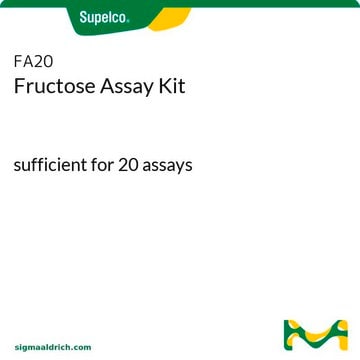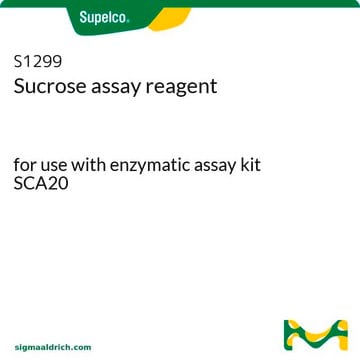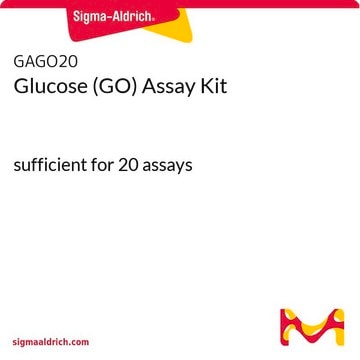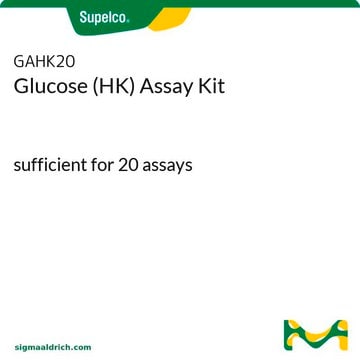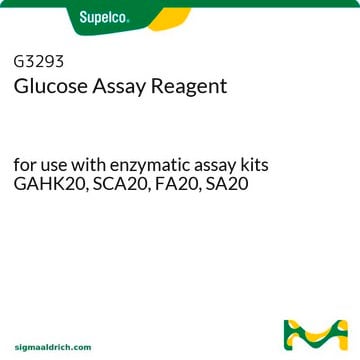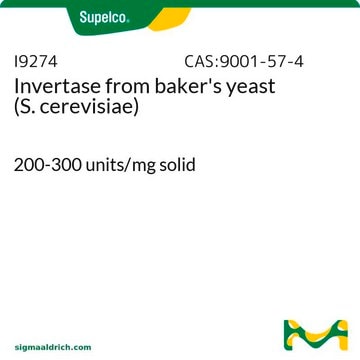SCA20
Sucrose Assay Kit
sufficient for 20 assays
Synonym(s):
Sucrose Test Kit
Sign Into View Organizational & Contract Pricing
All Photos(1)
About This Item
Recommended Products
usage
sufficient for 20 assays
analyte chemical class(es)
sugars (sucrose)
technique(s)
photometry: suitable
application(s)
food and beverages
general analytical
storage temp.
2-8°C
General description
Sucrose is a disaccharide, naturally occurring carbohydrate found in plants and a major product during photosynthesis.
Application
This kit is for the quantitative, enzymatic determination of sucrose in food and other materials. Sucrose is hydrolyzed to glucose and fructose by invertase. Glucose and fructose are phosphorylated by adenosine triphosphate (ATP) in the reaction catalyzed by hexokinase. Glucose-6-phosphate (G6P) is then oxidized to 6-phosphogluconate in the presence of nicotinamide adenine dinucleotide (NAD) in a reaction catalyzed by glucose-6-phosphate dehydrogenase (G6PDH). During this oxidation, an equimolar amount of NAD is reduced to NADH. The consequent increase in absorbance at 340 nm is directly proportional to sucrose concentration.
Kit Components Only
Product No.
Description
- glucose assay reagent 50 mL
- sucrose assay reagent 1 mL/vial
- sucrose standard 500 mg
related product
Product No.
Description
Pricing
Storage Class Code
10 - Combustible liquids
Certificates of Analysis (COA)
Search for Certificates of Analysis (COA) by entering the products Lot/Batch Number. Lot and Batch Numbers can be found on a product’s label following the words ‘Lot’ or ‘Batch’.
Already Own This Product?
Find documentation for the products that you have recently purchased in the Document Library.
Customers Also Viewed
Ye Ji Lee et al.
Frontiers in plant science, 12, 644455-644455 (2021-07-20)
Nitrogen is one of the most important macro-nutrients for plant growth and crop productivity. The amount of synthetic nitrogen fertilizers supplied to crops has dramatically increased, leading to a notable rise in crop yields. However, excessive nitrogen use has an
Raja S Payyavula et al.
BMC plant biology, 12, 39-39 (2012-03-21)
Plant secondary metabolites, including phenylpropanoids and carotenoids, are stress inducible, have important roles in potato physiology and influence the nutritional value of potatoes. The type and magnitude of environmental effects on tuber phytonutrients is unclear, especially under modern agricultural management
Bergmeyer, H.U. and Bernt, E.
Methods of Enzymatic Analysis, 1176-1176 (1974)
Raja S Payyavula et al.
Journal of experimental botany, 64(16), 5115-5131 (2013-10-08)
Much remains unknown about how transcription factors and sugars regulate phenylpropanoid metabolism in tuber crops like potato (Solanum tuberosum). Based on phylogeny and protein similarity to known regulators of phenylpropanoid metabolism, 15 transcription factors were selected and their expression was
Ching M Wai et al.
The Plant journal : for cell and molecular biology, 92(1), 19-30 (2017-07-04)
The altered carbon assimilation pathway of crassulacean acid metabolism (CAM) photosynthesis results in an up to 80% higher water-use efficiency than C3 photosynthesis in plants making it a potentially useful pathway for engineering crop plants with improved drought tolerance. Here
Our team of scientists has experience in all areas of research including Life Science, Material Science, Chemical Synthesis, Chromatography, Analytical and many others.
Contact Technical Service